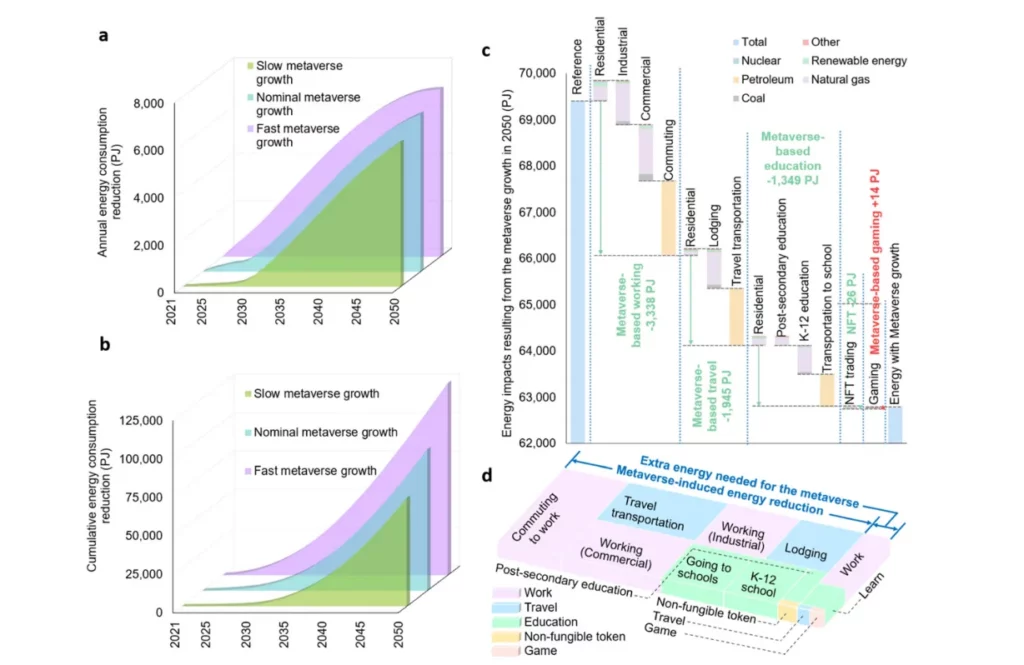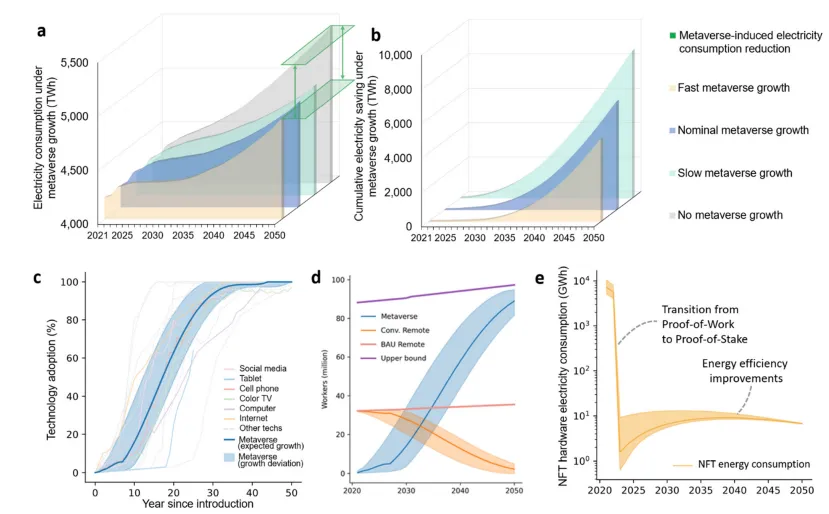- 1 Metaverse technologies require an ample amount of energy to operate.
- 2 Gaming remains the only aspect to see escalating power usage.
Extreme heat waves burning forests, rising sea levels sinking coastal cities, insane winds taking the foundations of homes with them, and more. The world is witnessing a swarm of events arising from climate change. All thanks to greenhouse gasses (GHGs) in the atmosphere. Governments seek to mitigate carbon emission risks to go carbon neutral. A recent study analyzes the metaverse as a means to lower the ill effects taking hold of the future.
Metaverse Alternates Could Reduce Energy Consumption
A report published in a peer-reviewed journal, Energy & Environmental Science, studied the climate impacts of the metaverse in forthcoming decades. The document raises the possibility of the technology’s adoption reaching its peak by 2050. Researchers used 3 adoption curves based on post-World War techs including color TVs, computers, ebooks, etc.
“The climate impacts indicate that the increasing adoption of the metaverse technologies will benefit climate change mitigation, and the metaverse sector growth can also facilitate energy saving, GHG emission reduction, and air quality improvement,” the paper highlighted.
Metaverse technologies including augmented reality (AR), virtual reality (VR), data centers and more require ample energy to operate. However, the impact is offset by the reduction in consumption by its physical alternatives like transportation. Traditional vehicles are a major contributor to rising carbon emissions.

A Responsible Use Needs to be Considered
Non-fungible tokens (NFTs) will potentially become an integral part of the metaverse. The document highlights a rise in these tokens might not increase their energy consumption attributing to a shift in energy efficient proof-of-stake (PoS) consensus mechanism. In September 2022, the second largest blockchain, Ethereum, shifted operations from proof-of-work (PoW) to PoS during The Merge. The move allegedly reduced GHG emissions from the blockchain by over 99%.

The authors of the document believe 6097-7054 petajoules could reduce domestic annual energy consumption. Of the five applications the researchers used for the study—remote work, virtual traveling, distance learning, NFT, and gaming— gaming remains the only aspect to see escalating power usage. Growing metaverse-based activities offset increased energy demand in residential consumption, tourism, and education.
Petrol and natural gas amounts for a major portion of greenhouse gasses. Although the metaverse-induced activities too require energy sources like coal and petroleum, it can lower the impact overall. The document highlights a faster adoption of metaverse technologies could leave the environment better than today.
Nonetheless, how enticing it appears, the metaverse can lead to mental disorders following a long exposure. Moreover, it may lead to a decline in social intelligence and fail to substitute in-person confabs’ impact. It may fulfill a nation’s intent to go carbon neutral, but a failure in responsible use could give rise to several psychological issues.
Anurag is working as a fundamental writer for The Coin Republic since 2021. He likes to exercise his curious muscles and research deep into a topic. Though he covers various aspects of the crypto industry, he is quite passionate about the Web3, NFTs, Gaming, and Metaverse, and envisions them as the future of the (digital) economy. A reader & writer at heart, he calls himself an “average guitar player” and a fun footballer.


 Home
Home News
News






